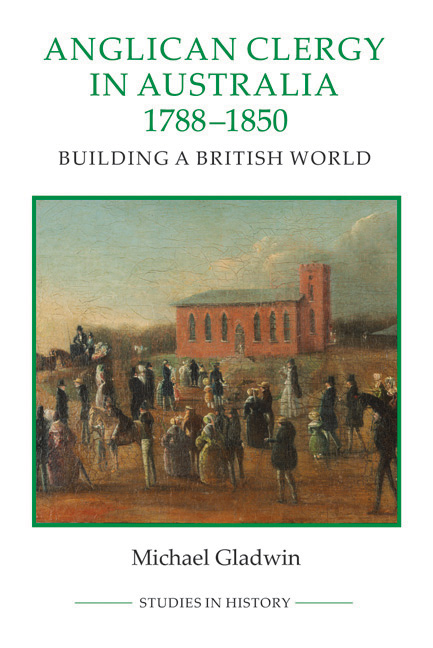Book contents
- Frontmatter
- Dedication
- Contents
- List of illustrations
- Acknowledgements
- Abbreviations
- Map
- Introduction
- PART I SINEWS: FUNDING, RECRUITMENT, BACKGROUNDS AND MOTIVATION, 1788-1850
- PART II CLERGYMEN IN COLONIAL AUSTRALIA, 1788-1850
- 4 Ecclesiastical roles: rites of passage and public worship
- 5 Flogging parsons? Chaplaincy, the magistracy and civil roles
- 6 Clergy, culture and society
- 7 Clergy and indigenous peoples
- PART III SCENES OF COLONIAL CLERICAL LIFE: AUSTRALIAN CLERGYMEN AND VOLUNTARISM, 1836-50
- Conclusion
- Bibliography
- Index
4 - Ecclesiastical roles: rites of passage and public worship
from PART II - CLERGYMEN IN COLONIAL AUSTRALIA, 1788-1850
Published online by Cambridge University Press: 05 December 2015
- Frontmatter
- Dedication
- Contents
- List of illustrations
- Acknowledgements
- Abbreviations
- Map
- Introduction
- PART I SINEWS: FUNDING, RECRUITMENT, BACKGROUNDS AND MOTIVATION, 1788-1850
- PART II CLERGYMEN IN COLONIAL AUSTRALIA, 1788-1850
- 4 Ecclesiastical roles: rites of passage and public worship
- 5 Flogging parsons? Chaplaincy, the magistracy and civil roles
- 6 Clergy, culture and society
- 7 Clergy and indigenous peoples
- PART III SCENES OF COLONIAL CLERICAL LIFE: AUSTRALIAN CLERGYMEN AND VOLUNTARISM, 1836-50
- Conclusion
- Bibliography
- Index
Summary
In part II the focus shifts from the clergy's metropolitan backgrounds to their roles and activities in Australia, and the extent to which these transcended colonial and imperial imperatives. Australian Anglican clergymen performed at least three distinct but interrelated roles in their society. The first was ecclesiastical, encompassing provision of worship, preaching and sacraments; the ‘occasional offices’ to mark rites of passage; and educating and catechising in duty to God and neighbour. This chapter explores how this work illuminates the clergy's relationship with society and state.
The second role of the clergy was civil and governmental. In the Australian colonies the clergy's civil duties included the maintenance of parish registers of births, deaths and marriages; the public communication of government information and inculcation of loyalty, order and public morality; magisterial duties; and various kinds of chaplaincy. while many clerical duties resembled those of metropolitan clergymen, some duties differed markedly due to extensive state oversight of colonial life, particularly before the transition to a free society from the 1820s. These duties are the focus of chapter 5.
The third role was social. Like their metropolitan counterparts, colonial clergymen were heavily involved in social welfare, which sometimes overlapped with their civil roles. This included the provision of charity, involvement in benevolent and philanthropic societies, and encouragement of thrift and savings banks for workers. Chapter 6 investigates the extent to which clergy worked in a state-directed or voluntary capacity. Attention is paid here to clergymen's underlying social theory in a period of transition towards free colonial societies and the economic orthodoxies of laissez-faire, individualism and self-help. The clergy's wider contribution to colonial development and economic life is further considered in this context.
Chapter 7 considers clergymen's relations with Australia's indigenous peoples, highlighting the clergy's ostensibly conflicting roles as both humanitarian activists and supporters of Britain's colonising and imperial projects.
- Type
- Chapter
- Information
- Anglican Clergy in Australia, 1788–1850Building a British World, pp. 97 - 113Publisher: Boydell & BrewerPrint publication year: 2015

